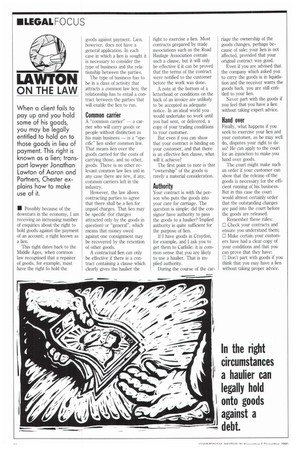When a client fails to pay up and you hold
Page 20

If you've noticed an error in this article please click here to report it so we can fix it.
some of his goods, you may be legally entitled to hold on to those goods in lieu of payment. This right is known as a lien; transport lawyer Jonathan Lawton of Aaron and Partners, Chester explains how to make use of it.
• Possibly because of the downturn in the economy, I am receiving an increasing number of enquiries about the right to hold goods against the payment of an account; a right known as a lien.
This right dates back to the Middle Ages, when common law recognised that a repairer of goods, for example, must have the right to hold the goods against payment. Lien, however, does not have a general application. In each case in which a lien is sought it is necessary to consider the type of business and the relationship between the parties.
The type of business has to be in a class of activity that attracts a common law lien; the relationship has to entail a contract between the parties that will enable the lien to run.
Common carrier
A "common carrier" — a carrier who will carry goods or people without distinction as his main business — is a "specific" lien under common law. That means lien over the goods carried for the costs of carrying those, and no other, goods. There is no other relevant common law lien and in any case there are few, if any, common carriers left in the industry.
However, the law allows contracting parties to agree that there shall be a lien for unpaid charges. That lien may be specific (for charges attracted only by the goods in question) or "general", which means that money owed against one consignment may be recovered by the retention of other goods.
A contractual lien can only be effective if there is a contract containing a clause which clearly gives the haulier the right to exercise a lien. Most contracts prepared by trade associations such as the Road Haulage Association contain such a clause, but it will only be effective if it can be proved that the terms of the contract were notified to the customer before the work was done.
A note at the bottom of a letterhead or conditions on the back of an invoice are unlikely to be accepted as adequate notice. In an ideal world you would undertake no work until you had sent, or delivered, a copy of your trading conditions to your customer.
But even if you can show that your contract is binding on your customer, and that there is an effective lien clause, what will it achieve?
The first point to note is that "ownership" of the goods is rarely a material consideration.
Authority
Your contract is with the person who puts the goods into your care for carriage. The question is simple: did the consignor have authority to pass the goods to a haulier? Implied authority is quite sufficient for the purpose of lien.
If I have goods in Croydon, for example, and I ask you to get them to Carlisle: it is common sense that you are likely to use a haulier. That is implied authority.
During the course of the car riage the ownership of the goods changes, perhaps because of sale; your lien is not affected, provided that your original contract was good.
Even if you are advised that the company which asked you to carry the goods is in liquidation and the receiver wants the goods back, you are still entitled to your lien.
Never part with the goods if you feel that you have a lien without taking expert advice.
Hand over
Finally, what happens if you seek to exercise your lien and your customer, as he may well do, disputes your right to do so? He can apply to the court for an injunction to make you hand over goods.
The court might make such an order if your customer can show that the release of the goods is necessary for the efficient running of his business. But in this case the court would almost certainly order that the outstanding charges are paid into the court before the goods are released.
Remember these rules: 0 Check your contracts and ensure you understand them; 0 Make certain your customers have had a clear copy of your conditions and that you can prove that they have; 0 Don't part with goods if you think that you may have a lien without taking proper advice.












































































